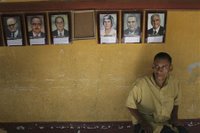Nicaragua / Socialists back to power
 Former Marxist revolutionary Daniel Ortega was headed back to power on Monday in a presidential election 16 years after Nicaragua's voters ousted him to end a brutal civil war with U.S.-trained Contra rebels.
Former Marxist revolutionary Daniel Ortega was headed back to power on Monday in a presidential election 16 years after Nicaragua's voters ousted him to end a brutal civil war with U.S.-trained Contra rebels.
With 91 percent of the vote counted from Sunday’s balloting, Mr. Ortega led five other candidates with 38 percent of the vote, while the second-place candidate, Eduardo Montealegre, a conservative, trailed with 29 percent, election officials said Tuesday night. The third-place candidate, José Rizo, received 26 percent.
Ortega's almost certain victory was a blow to Washington and reinforces an anti-U.S. alliance in Latin America led by Venezuelan President Hugo Chavez.
Hundreds of Ortega's Sandinista party supporters, some riding on horseback, took to the streets at sunset on Monday to wave black-and-red party flags and celebrate. "It is great happiness. It came at last after 16 years of hunger and unemployment," said a delighted Rafael Vega, 67.
"Daniel has changed over confronting the United States but neither are we going to be submissive and say 'Yes, sir' to everyone," Vega said, smiling.
Ortega, 60, has dropped the hard-line policies of his revolutionary past and campaigned on a center-left platform. He backs a free trade pact with the United States and says he has no interest in clashing with his old enemy.
He stopped short of claiming victory on Monday night, preferring to wait until final official results, but he said was ready to work with other parties to "eradicate poverty and reassure the private sector and international investors".
Eduardo Montealegre, a conservative and Washington's favored candidate, trailed well behind Ortega in second place on 30.9 percent.
Later in the evening, Mr. Ortega and Mr. Montealegre appeared together at the Sandinista headquarters, where they pledged to put aside past differences. “Here we cannot talk about winners or losers,” he said. “Here simply we have a process where really everyone will work together for the good of Nicaragua.”
Still, Mr. Ortega still rails against “savage capitalism” and the failure of free trade to alleviate poverty.
The United States has made it clear that it does not like the prospect of its cold war foe returning to power, especially in light of Mr. Ortega’s close relationship with President Hugo Chávez of Venezuela. Still, Secretary of State Condoleezza Rice said the United States would respect the decision of the Nicaraguan people and see what policies the next government follows before making decisions about future relations. Bush administration officials had threatened before the vote to suspend aid if Mr. Ortega won.
Since 1990s, the government has sold off more than 360 state-owned enterprises, liberalized its markets, privatized the banks and entered a free trade agreement with the United States and its neighbors.
Erwin J. Kruger, president of the Superior Council of the Private Sector, the nation’s largest business group, said Mr. Ortega and his party, the Sandinista National Liberation Front, had given assurances they would not dismantle the free-market economy.
“We don’t know how he’s going to be tomorrow, or next month, or next year, but we are going to give it a chance,” Mr. Kruger said. “We paid a high price for our freedom and neither side wants to lose that.”
Washington too fears he will stand alongside Venezuela's Chavez and Cuban President Fidel Castro in challenging U.S. interests. Chavez helped Ortega's election campaign by sending cheap fertilizer and fuel to Sandinista-led groups. Ortega was a leader of the popular Sandinista revolution that toppled U.S.-backed dictator Anastasio Somoza in 1979.
He then allied the country with the Soviet Union and U.S. President Ronald Reagan firmly backed Contra rebels in Nicaragua as Central America became a Cold War battleground.
U.S. officials recently warned of a cut in investment and aid to Nicaragua, the second poorest nation in the Western Hemisphere after Haiti, if Ortega was returned to power. Nicaraguans apparently ignored the U.S. warnings. They instead punished conservative candidates after three straight pro-U.S. governments failed to tackle poverty and were hit by a series of corruption scandals.
Cuban Vice President Carlos Lage said Ortega's victory was a "resounding defeat" for the United States.
U.S. officials said they found irregularities in voting but former President Jimmy Carter, whose Carter Center has observed elections in Nicaragua since 1990, said any problems were minor and this was the best prepared vote they had seen here.
It was Ortega's third comeback attempt since 1990, when voters weary of the Contra war and a deep economic crisis turned against him. With the Sandinistas out of power, Contra rebels disarmed months later.
Ortega now speaks more of God than revolution but he still worries many Nicaraguans who blame Sandinista rule for the 30,000 war dead, hyperinflation and rationing in the 1980s.
"That man took our children and sent them to war. We had no food, it was impossible to live here," said Claudia Ruiz, a middle-aged woman in Managua. "How is it possible that people voted for him?"
Ortega supporters say the Sandinistas tried to help the poor but were crippled by a U.S. embargo and the Contra war. "They never let Ortega govern," said Adela Martinez as she voted on Sunday in Managua. "Let's give him another chance."




No comments:
Post a Comment